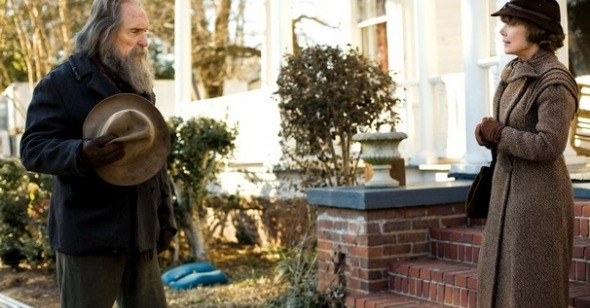Deathly
By Leah Churner
Get Low
Dir. Aaron Schneider, U.S., Sony Pictures Classics
Get Low is based on a true account of a 79-year-old Tennessee bachelor who, in the 1930s, publicly staged his own funeral. According to Sony Pictures Classics’ press package, the “classic American yarn” about Felix Bushaloo Breazeale’s funeral is “an American folktale passed down by storytellers for decades, spreading across distance and time to take on a larger-than-life legend.” I’m not familiar with this tale (or with the existence of any great oral tradition in the modern South), but a Google search affirms that Breazeale was profiled in several newspapers in 1938 and invited as a guest on Ripley’s Believe It or Not! on NBC radio the following year. A similar affair was attempted with disastrous results down in Miami in 1992, when one Sophia Petrillo decided to host a living-wake party and put her scatterbrained roommate in charge of the invitations (guess which of the Golden Girls forgot to tell everybody Sophia wasn’t really dead!).
Mr. Breazeale’s sentiment is not crazy—most of us have fantasized about our own funerals at some point—but the characters in Get Low have difficulty wrapping their heads around it. Typical of the writing and pacing in director Aaron Schneider’s film is a line from the funeral director’s assistant (played by Lucas Black), drawn out for so long that sighs from the audience are audible between his pauses: “You wanna be at your funeral. Party. Alive? But. You can’t have a funeral if you’re not. Y’know. Deceased.” This comes somewhere in reel three, after Felix (played by Robert Duvall) has twice pitched his request. The writing is where the trouble starts, but the story’s tiresomeness is also two parts Schneider’s fault. He edited the film as well, and the audience would be obliged if Schneider would trim all the laborious reactions by half.
Producer Dean Zanuck, son of Richard and grandson of Darryl, allegedly spent nine years trying come up with $7 million to make this movie, but the final version feels too cardboard to be a passion project. The yokels in Get Low are unfunny cartoons. Duvall’s Felix is a hermit who eats squirrels and blasts at “trespassers” with a shotgun; when he drives up Main Street in his mule-drawn buggy, the local folks stop and stare, pelt him with rocks. Preachers shower him with platitudes and shame him for sins they dare not mention. The whole town, it seems, has a bone to pick with Felix, and hardly a scene goes by without some townie whispering of “all the stories” they’ve heard about his long-ago atrocities, but the tittle-tattlers never divulge any specific details.
In the face of intolerance, Felix hires a funeral parlor of ill repute, run by an irreverent, flask-toting Chicagoan (Bill Murray, who provides no comic relief) and his desperately incredulous assistant (Black, fogging up the camera with proclamations of the obvious). They form a whimsical trio of “outsider” showmen, running ads in the newspaper about Felix’s plan, appearing on the radio, inviting everybody to “come on down” to the ceremony and recount their juiciest rumors about the old man. As an incentive for attendees, the heirless Felix will raffle off his acreage. Sissy Spacek shows up occasionally as the old flame who holds the key to his mysterious past, but the romance angle gets tricky once Felix reveals he never really loved her. The convoluted plot starts to smell like a shaggy dog story, and it comes as no surprise when it turns out the old bugger has been misunderstood all along.
Cinematographer David Boyd (Deadwood) brings a touch of HBO-baroque to the screen, which is fine—his winter light is crisp, melancholic, very refreshing in the armpit of July. Less welcome is the sound design of Get Low, bloated with outsize musical cues. (Thirty blaring violins! What’s happening? Felix is feeding his mule.) A funkily plucked guitar string serves the purpose of a laugh track, pointing us to stabs at humor we otherwise wouldn’t recognize as comedy.
The most cursory research suggests that Schneider either didn’t do his homework or he has no sense of cinematic texture. A website managed by a relative of the real Felix Breazeale (“Uncle Bush’s Page”) reprints a local reporter’s article about the actual event, brimming with ornate imagery:
As the minister talked, the portable public address system blinked out and the throng pushed forward to hear his words . . . Uncle Felix, calm as a September morning, sat in front of the preacher, peering through overhanging sycamore branches . . . People crowded forward to shake Uncle Bush's hand and pat the satin gleam of his casket . . . Men in jeans stuck gladiola or carnation blooms into their shirt pockets or carried tight bouquets of fern and flowers [as] the big floral offerings were stripped bare as a plucked chicken.
None of these details made it into the screenplay. Rather than a vivid scene of jollity and well wishing, gladiolas and satin, Get Low gives us a crowd of passive, solemnly slack-jawed gawkers. They stare and stare, waiting for Mr. Duvall to finish a many-paged, Oscar-hopeful monologue. And that’s exactly how audiences will engage with Get Low.
